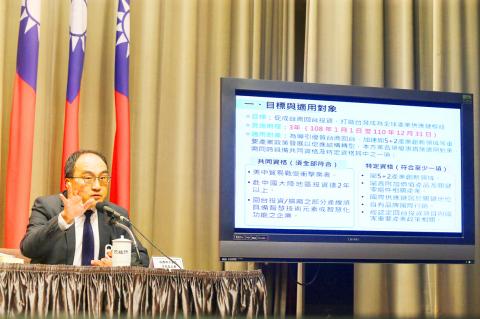The Executive Yuan yesterday approved a three-year plan to attract investment from Taiwanese businesses in China affected by the current US-China trade dispute.
The plan, which is to take effect on Jan. 1, focuses on five areas — land use, labor, tax services, water and electricity supply, and fast financing — and only businesses affected by the trade dispute, that have been investing in China for more than two years and that want to investing in production lines incorporating smart technology would be eligible, it said.
They must also be in an industry targeted by the government’s “five plus two” innovative industries plan or produce a high value-added product, it said.

Photo: CNA
Regulations for employing foreign workers would be relaxed for businesses that open new factories in Taiwan or expand existing ones to a certain size, it said.
For companies in the high-tech field, they must invest more than NT$250 million (US$8.11 million) and create 100 — or 20 percent — additional jobs for Taiwanese workers, it said.
Those in other industries would have to invest more than NT$50 million and create 50 — or 20 percent — more jobs for Taiwanese workers, it said.
Workers’ monthly salaries would need to be at least NT$30,000, it said.
Companies that meet those requirements would be eligible for an advanced allocation of their foreign worker quota, would not be subject to regular inspections of their local-to-foreign worker ratio for a year and be able to have foreign workers fill up to 40 percent of their jobs, it said.
The National Development Fund has also set aside NT$20 billion to loan to businesses returning to Taiwan under this plan, but this amount could be raised if the funding is used up before the end of the plan, the Executive Yuan said.
The government is able to provide about 435 hectares now and an additional 873 hectares would be included between next year and 2021, it said.
The Water Resources Agency and Taiwan Power Co are to help manufacturers quickly secure their water and electricity supplies, and national taxation bureaus nationwide are to provide businesses returning to Taiwan with consultation services, the Executive Yuan said.
InvesTaiwan is to be responsible for processing applications, which would be jointly reviewed — within two weeks — by different government agencies, it added.
In related news, during the question-and-answer portion of a meeting of the legislature’s Social Welfare and Environmental Hygiene Committee, Democratic Progressive Party Legislator Huang Hsiu-fang (黃秀芳) said that some people have already begun saying that relaxing the employment restrictions on foreign workers for returning overseas businesses would be unfair to local firms that already face a labor shortage.
Minister of Labor Hsu Ming-chun (許銘春) told Huang that the planned relaxation is conditional and that a sunset clause would be applied.

An essay competition jointly organized by a local writing society and a publisher affiliated with the Chinese Communist Party (CCP) might have contravened the Act Governing Relations Between the People of the Taiwan Area and the Mainland Area (臺灣地區與大陸地區人民關係條例), the Mainland Affairs Council (MAC) said on Thursday. “In this case, the partner organization is clearly an agency under the CCP’s Fujian Provincial Committee,” MAC Deputy Minister and spokesperson Liang Wen-chieh (梁文傑) said at a news briefing in Taipei. “It also involves bringing Taiwanese students to China with all-expenses-paid arrangements to attend award ceremonies and camps,” Liang said. Those two “characteristics” are typically sufficient

A magnitude 5.9 earthquake that struck about 33km off the coast of Hualien City was the "main shock" in a series of quakes in the area, with aftershocks expected over the next three days, the Central Weather Administration (CWA) said yesterday. Prior to the magnitude 5.9 quake shaking most of Taiwan at 6:53pm yesterday, six other earthquakes stronger than a magnitude of 4, starting with a magnitude 5.5 quake at 6:09pm, occurred in the area. CWA Seismological Center Director Wu Chien-fu (吳健富) confirmed that the quakes were all part of the same series and that the magnitude 5.5 temblor was

The brilliant blue waters, thick foliage and bucolic atmosphere on this seemingly idyllic archipelago deep in the Pacific Ocean belie the key role it now plays in a titanic geopolitical struggle. Palau is again on the front line as China, and the US and its allies prepare their forces in an intensifying contest for control over the Asia-Pacific region. The democratic nation of just 17,000 people hosts US-controlled airstrips and soon-to-be-completed radar installations that the US military describes as “critical” to monitoring vast swathes of water and airspace. It is also a key piece of the second island chain, a string of

The Central Weather Administration has issued a heat alert for southeastern Taiwan, warning of temperatures as high as 36°C today, while alerting some coastal areas of strong winds later in the day. Kaohsiung’s Neimen District (內門) and Pingtung County’s Neipu Township (內埔) are under an orange heat alert, which warns of temperatures as high as 36°C for three consecutive days, the CWA said, citing southwest winds. The heat would also extend to Tainan’s Nansi (楠西) and Yujing (玉井) districts, as well as Pingtung’s Gaoshu (高樹), Yanpu (鹽埔) and Majia (瑪家) townships, it said, forecasting highs of up to 36°C in those areas